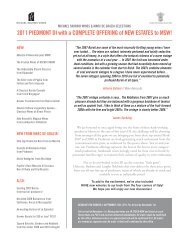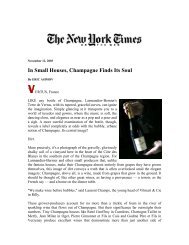German Catalog 2006 USE THIS ONE.qxp - Michael Skurnik Wines
German Catalog 2006 USE THIS ONE.qxp - Michael Skurnik Wines
German Catalog 2006 USE THIS ONE.qxp - Michael Skurnik Wines
You also want an ePaper? Increase the reach of your titles
YUMPU automatically turns print PDFs into web optimized ePapers that Google loves.
42<br />
Treking up the Erdener Treppchen<br />
name, he places himself on the scene, and customers<br />
ensue. This means a guy like me just isn’t going to make<br />
the kinds of “discoveries” which were so easy fifteen years<br />
ago. If a producer is good, he’s not waiting around hoping<br />
to be discovered; he’s aggressively marketing himself.<br />
The second major change, the more important one, is<br />
economical. Until around the late ‘60s, there was equilibrium<br />
between costs of production and prices paid. Few vintners<br />
were cash-rich but most did well enough. Their expectations<br />
were modest. They defined “affluence” differently<br />
than we do.<br />
Then in the ‘70s costs began to rise, driven by labor,<br />
driven by the disinclination of the young to break their<br />
balls on the steep-slopes. For a while the growers lived<br />
on whatever fat they’d been able to accumulate. By the<br />
late ‘80s - early ‘90s, they were scraping bone. The young<br />
man or woman emotionally committed to assuming the<br />
reins was only going to do so if he could make a decent<br />
living. These young people were far more cosmopolitan<br />
than their parents; they traveled widely, drank other<br />
wines, knew other markets, and saw the prices vintners<br />
were getting in other parts of the world.<br />
All of us who love <strong>German</strong> wine share a certain<br />
guilty secret; we know they are grossly underpriced.<br />
They are the last absurd bargains of the wine world. But<br />
we cannot expect young people to carry on this beautiful<br />
culture, this noble craft, for nothing but the altruistic<br />
glamour of it all. Glamour don’t pay the bills. Prices are<br />
going to rise. It is the cost we all must pay to ensure the<br />
survival of the people and the wines we love so much.<br />
For everyone along the Mosel plays the same<br />
lament; labor. It’s hard to get, and because it’s hard to get<br />
it commands a high price. The slopes are forbiddingly<br />
steep—it’s physically dangerous to work such land—and<br />
there’s very little feasible machine work. Hand-labor on<br />
steep slopes in this satellite-TV world is not consistent<br />
with Kabinett wine costing $10.<br />
As a merchant I am caught in the middle. I want<br />
Mosel wine to survive because I love it almost helplessly.<br />
My conscience revolts at dunning a producer for pfennigs<br />
(or cents in the brave new Euro-world) while I look out<br />
his window at the perpendicular mountains I know he<br />
has to work in. But neither do I wish to deliver stickershock<br />
to you, cherished customer. So we’re going to let<br />
prices creep steadily upward until equilibrium is<br />
restored.<br />
The Mosel can be cruel. Floods are routine, including<br />
an especially nerve-wracking flood during the harvest<br />
of 1997. (“In the next life,” Sigrid Selbach told me, “I<br />
don’t think I’d buy a house along the river.”) On<br />
Christmas day 1993 the highest water in two hundred<br />
years poured through villages and into cellars. As it had<br />
ruptured several underground fuel-storage tanks, the<br />
floodwaters were also slick and smelly. You can’t get<br />
insurance for flooding and the economic consequences<br />
of the flood of 1993 were devastating. People will show<br />
you pictures and show you the water marks in their<br />
homes. And the following year saw equally remorseless<br />
flooding: how much can these people endure? The newworld<br />
winemaker “lifestyle” is the heaven these Mosel<br />
vintners hope they’ll go to someday.<br />
The Mosel is also a self-contained culture. Despite<br />
the length of the river (and its tributaries) there is a certain<br />
cohesion there, more so than in other <strong>German</strong> wine<br />
regions. This isn’t always good, mind you; there’s more<br />
than a little Hatfield vs. McCoy chicanery along with the<br />
petty jealousies afflicting small village life throughout<br />
most of the world. One day Andreas Adam planted a<br />
But the Mosel can be cruel. Floods are<br />
routine, including an especially nervewracking<br />
flood during the harvest of 1997.<br />
quarter-hectare. When he went out the following day to<br />
continue, everything he planted the day before had been<br />
vandalized. The young man is sure of himself (as he has<br />
every right to be), and this infuriated a neighbor. These<br />
cultures are not exclusively lyrical! Yet I have rarely seen<br />
such a spirit of true neighborliness as I have on the<br />
Mosel, at times, among families where there’s mutual<br />
respect and trust.<br />
At Hans Selbach’s funeral I spent a few moments<br />
gazing at the faces of the hundreds of mourners, an<br />
entire panoply of Moselaners, and it was like looking<br />
backward in time. Nearly every face could have been<br />
carved on a Roman coin, all these fine faces etched in<br />
sadness. All those lives for all those years, beautiful and<br />
solemn and brief. Some Summer I’ll take my son Max<br />
with me to visit the Mosel. He’s not a wine-guy (not yet<br />
anyway . . .) and we’re not going to do a lot of tasting, but<br />
there are people I want him to see. Schaefer, Merkelbach,<br />
Schmitt, Selbachs of course. I want him to see their faces,<br />
and then to walk in their vineyards. At some point I<br />
know he’ll look down at the steepness in shock—we all<br />
do, even when we’ve been there before—and perhaps<br />
he’ll ask me Why do people make wine here?<br />
What would you have me tell him?
















